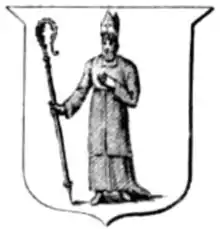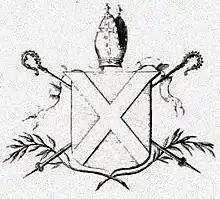Arthur Rose
Arthur Rose (also found as Ross; 1634–1704) was a Scottish minister, Archbishop of St Andrews, and, informally, the first Episcopal Primate of Scotland, after the fall of the Restoration Episcopate in 1689.
The Most Reverend Arthur Rose | |
|---|---|
| Archbishop of St Andrews Primate of Scotland | |
| Church | Scottish Episcopal Church |
| Archdiocese | St Andrews |
| In office | 1684-1704 |
| Predecessor | Alexander Burnet |
| Successor | James Rose (As Bishop of Fife) |
| Orders | |
| Consecration | 28 April 1675 by Robert Leighton |
| Personal details | |
| Born | 1634 |
| Died | 13 June 1704 Edinburgh, Scotland |
| Buried | Restalrig |
| Nationality | Scottish |
| Parents | John Rose Elizabeth Wood |
| Spouse | Barbara Barclay |
| Education | University of Aberdeen |
Life
The younger son of Elizabeth Wood and her husband, John Rose, minister of Birse, he was born in 1634. Graduating from Marischal College on 9 July 1652, he chose to follow his father's church career, and on 5 April 1655, he received his licence from the presbytery of Garioch, obtaining the parish of Kinearny in the following year.
Rose's position in the church improved when he was moved to the nearby parish of Old Deer in Autumn 1663. In the following year he became rector of Marischal College, his alma mater, and later in the same year was given control of St Mungo's, Glasgow, after being persuaded by Alexander Burnet, then Archbishop of Glasgow. In 1675 he became Bishop of Argyll, while retaining control of the St Mungo's parsonage. On 5 September 1679, he was translated to the diocese of Galloway, having been elected as Bishop of Galloway earlier in the year.
However, Rose was not to be Bishop of Galloway for long, for in October of the same year he succeeded Burnet as Archbishop of Glasgow. Five years later he succeeded Alexander Burnet again, this time after the latter's death rather than promotion. Rose was formally installed as Archbishop of St Andrews and Primate of Scotland on 25 December 1684. Rose was Archbishop until on 22 July 1689, when parliament abolished all prelates in Scotland. He continued discreetly as an Episcopalian, remaining informally the primate until his death on 13 June 1704. He died at Campbell's Close in Canongate, Edinburgh, and was buried in the graveyard of the church of Restalrig.
References
- Clarke, Tristram, "Ross , Arthur (1634–1704)", in the Oxford Dictionary of National Biography, Oxford University Press, 2004 , accessed 1 May 2007
- Keith, Robert, An Historical Catalogue of the Scottish Bishops: Down to the Year 1688, (London, 1824)
| Church of Scotland titles | ||
|---|---|---|
| Preceded by William Scrogie |
Bishop of Argyll x 1675–1679 |
Succeeded by Colin Falconer |
| Preceded by John Paterson |
Bishop of Galloway 1679 |
Succeeded by James Aitken |
| Preceded by Alexander Burnet |
Archbishop of Glasgow 1679–1684 |
Succeeded by Alexander Cairncross |
| Preceded by Alexander Burnet |
Archbishop of St Andrews 1684–1689 |
Office abolished |
| Scottish Episcopal Church titles | ||
| New office | Primate and Metropolitan of the Scottish Episcopal Church 1689–1704 |
Vacant Title next held by John Fullartonas Primus |
| Academic offices | ||
| Preceded by Unknown |
Rector of Marischal College, Aberdeen 1664–? |
Succeeded by Unknown |
| Preceded by Alexander Burnet |
Chancellor of the University of Glasgow 1679–1683 |
Succeeded by Alexander Cairncross |
| Preceded by The Archbishop of St Andrews |
Chancellor of the University of St Andrews 1684–1689 |
Succeeded by The Duke of Atholl |

